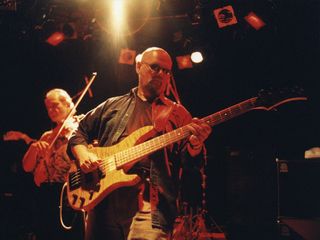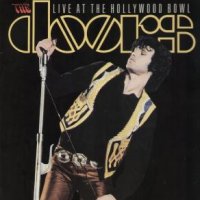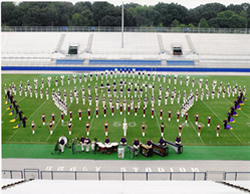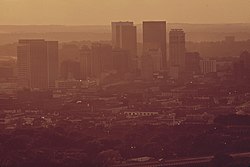Alabama has played a central role in the development of both blues and country music. Appalachian folk music, fiddle music, gospel, spirituals, and polka have had local scenes in parts of Alabama. The Tuskegee Institute's School of Music, especially the Tuskegee Choir, is an internationally renowned institution. There are three major modern orchestras, the Mobile Symphony, the Alabama Symphony Orchestra and the Huntsville Symphony Orchestra; the last is the oldest continuously operating professional orchestra in the state, giving its first performance in 1955.

Legion Field is an outdoor stadium in the southeastern United States in Birmingham, Alabama, primarily designed to be used as a venue for American football, but occasionally used for other large outdoor events. Opened in 1927, it is named in honor of the American Legion, a U.S. organization of military veterans.

War Eagle is a battle cry, yell, or motto of Auburn University and supporters of Auburn University sports teams, especially the Auburn Tigers football team. War Eagle is a greeting or salutation among the Auburn Family. It is also the title of the university's fight song and the name of the university's golden eagle.

The Dixie Dregs is an American rock band from Augusta, Georgia. Formed in 1970, the band's performance consists entirely of instrumentals that fuse elements of diverse genres such as rock, classical music, country, jazz and bluegrass into an eclectic sound that is difficult to categorize. Recognized for their virtuoso playing, the Dixie Dregs were identified with the southern rock, progressive rock and jazz fusion scenes of the 1970s.
Backwater or Backwaters may refer to:
Patrick Joseph Sullivan was an American professional football player and college coach. An All-America quarterback for the Auburn Tigers, he won the Heisman Trophy in 1971 and then played six seasons in the National Football League (NFL) with the Atlanta Falcons and Washington Redskins. Sullivan was a head football coach at Samford University, a position he held from 2007 to 2014. He was previously the head football coach at Texas Christian University (TCU) from 1992 to 1997 and the offensive coordinator at the University of Alabama at Birmingham (UAB) from 1999 to 2006. Sullivan was inducted into the College Football Hall of Fame as a player in 1991.
The University of Alabama is a school with many traditions. This article describes several of these traditions.

Cleveland Josephus Eaton II was an American jazz double bassist, producer, arranger, composer, publisher, and head of his own record company in Fairfield, Alabama, a suburb of Birmingham. His most famous accomplishments were playing with the Ramsey Lewis Trio and the Count Basie Orchestra. His 1975 recording Plenty Good Eaton is considered a classic in the funk music genre. He has been inducted into both the Alabama Jazz Hall of Fame and the Alabama Music Hall of Fame.

Thomas Joseph Beckwith was an American baseball pitcher who played seven seasons in Major League Baseball (MLB). He played for the Los Angeles Dodgers and Kansas City Royals from 1979 to 1986. He threw right-handed and served primarily as a relief pitcher.

Live at the Hollywood Bowl is the third official live album by the American rock band the Doors, released in May 1987 by Elektra Records. The concert was recorded on July 5, 1968, at the Hollywood Bowl in Los Angeles, the Doors' hometown.

The Marching Pride of North Alabama, is the official marching band of the University of North Alabama. The band is the largest organization on campus, and performs at all North Alabama Lions football home games, as well as local parades and high school competition exhibitions across the state.

The TCB Band is a group of professional musicians who formed the core rhythm section of Elvis Presley’s band from August 1969 until his death in 1977.. The initials TCB stands for Taking Care of Business, a personal motto Presley adopted in the early 1970s. Although personnel changed over the years, the original members were James Burton, Jerry Scheff (bass), John Wilkinson, Larry Muhoberac (keyboards) and Ron Tutt (drums). They first appeared live at Presley’s first Las Vegas performance at what was then known as the International Hotel on July 31, 1969.

The Million Dollar Band is the official marching band of the University of Alabama. Founded in 1912, the Million Dollar Band is the largest student organization at the University of Alabama. The band performs during pregame and halftime of every home and neutral-site Alabama football game; it also supplies at least a pep band to every away football game, as well as home men's basketball, women's basketball, women's gymnastics, and volleyball games. In 2003, the band was awarded the Sudler Trophy, recognizing it as one of the top college bands in the United States.
Auburn University has several notable traditions, many related to its varsity teams, the Auburn Tigers.
Frank Webb "Buddy" Gardner, Jr. is an American professional golfer.

Harold Wayne Greenhaw was an American writer and journalist. The author of 22 books who chronicled changes in the American South from the civil rights movement to the rise of a competitive Republican Party, he is known for his works on the Ku Klux Klan and the exposition of the My Lai Massacre of 1968. Greenhaw wrote for various Alabamian newspapers and magazines, worked as the state's tourism director, and was considered "a strong voice for his native state".











